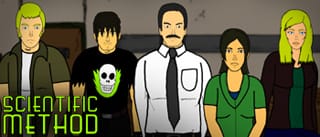Simple Past
Table of Contents
I. Principles of Formation
The complete form will be made up of a Base, a Typical (or Tense) Vowel, and the Personal Ending.
Base
For regular -er, -ir, and –re verbs, the Base is the Present Stem (= the infinitive minus the infinitive ending). About the Base for irregular verbs, see IV below.
Typical Vowel
For regular –er verbs, it is –a-; for regular –ir and –re verbs, is is –i-. For irregular verbs, it is either –i– or –u-; see IV.
Personal Endings
The personal endings of the simple past for most verbs (regular –ir and –re, and all irregulars [except aller]) are these:
-s, -s, -t, -^mes, -^tes, -rent (pronounced: [-, -, -, m, t, r])
Note that the singular endings are not pronounced, while the plural endings consist in a single consonant sound.
–er verbs (plus aller) have slightly different singular endings:
-i, -s, -Ø 1
II. Simple Past of Regular –ir and -re Verbs
Formation: Base + Typical Vowel (= –i-) + Personal Endings
The Base, for a –ir or –re verb, is the same as the Present Stem. E.g., for finir, > finir > fin-. For rendre, > rendre > rend-.
The Typical Vowel for the simple past of these verbs is: -i-
The Typical Vowel i and Personal Endings combined give:
| -Is | -Îmes | [i] | [im] |
| -Is | -Îtes | [i] | [it] |
| -It | -Irent | [i] | [ir] |
Joined to the bases fin– and rend–, these give:
| finis | rendis |
| finis | rendis |
| finit | rendit |
| finîmes | rendîmes |
| finîtes | rendîtes |
| finirent | rendirent |
Watch out! The singular forms for the present and simple past of an –ir verb are identical.
| Present | Simple Past |
| finis | finis |
| finis | finis |
| finit | finit |
III. Simple Past of Regular -er Verbs (and aller)
Formation: Base + Typical Vowel (= –a-) + Personal Endings
The Base of a regular –er verb is the Present Stem. E.g., for penser, penser > pens-. 2
The Typical Vowel (–a–) with the Personal Endings added (-i, -s, -Ø, 1 -^mes, -^tes, -rent) gives:
| Looks Like | Sounds Like | ||
| -Ai | -Âmes | [e] | [ɑm] |
| -As | -Âtes | [a] | [ɑt] |
| -A | -Èrent | [a] | [ɛr] |
(Observe that the Typical Vowel -a- changes to a -è- in the 3rd person plural.)
Joined to the present stem pens– the above forms produce:
| pensai | pensâmes |
| pensas | pensâtes |
| pensa | pensèrent |
Do not confuse the simple past of an –er verb with its future:
| Simple Past | Future |
| pensai | penserai |
| pensas | penseras |
| pensa | pensera |
| pensâmes | penserons |
| pensâtes | penserez |
| pensèrent | penseront |
IV. Simple Past of Irregular Verbs
Formation: Base +Typical Vowel (-i- or –u-) + Personal Endings
The Personal Endings are the usual: -s, -s, -t, -^mes, -^tes, -rent.
The Typical Vowel is either a –u– or an –i– (with a little interpretation in some cases).
The Base for the simple past of these verbs most often is not the present stem. Two cases arise:
A. When the Simple Past Resembles the Past Participle
Many irregulars have a simple past that looks like the past participle with personal endings slapped on.
- avoir: Past participle eu. Simple past: eus, eus, eut, eûmes, eûtes, eurent
- (analysis: e + u + PE, or: Ø 1 + eu + PE)
- vouloir: Past participle: voulu. Simple past: voulus, voulus, voulut, voulûmes, voulûtes, voulurent
- (analysis: voul + u + PE)
- dire. Past participle: dit. Simple past: dis, dis, dit, etc.
- (analysis: d + i + PE)
- devoir. Past participle: dû. Simple Past: dus, dus, dut, etc.
- (analysis: d + u + PE)
- croire (to believe) & croître (to grow). Past participles: cru & crû. Simple pasts:
- (croire:) crus, crus, crut,crûmes, crûtes, crurent (analysis: cr + u + PE)
- (croître:) crûs, crûs, crût, crûmes, crûtes, crûrent (analysis: cr + û + PE)
- recevoir (to receive). Past participle: reçu. Simple Past: reçus, reçus, reçut, etc.
- (analysis: reç + u + PE)
- vivre. Past participle: vécu. Simple past: vécus, vécus, vécut, etc.
- (analysis: véc + u + PE)
B. When the Simple Past DOESN’T Resemble the Past Participle
But other irregulars have a simple past that can’t be predicted from the past participle. You should learn these.
- Verbs Ending in –uire (traduire, construire, etc.)
- E.g., construire. Past participle: construit. But simple past: construisis, etc. (analysis: construis + i + PE)
- Verbs Ending in –Vindre (craindre, feindre, poindre, etc.)
- E.g., joindre. Past Participle: joint. But simple past: joignis, etc. (analysis: joign + i + PE)
- Verbs like ouvrir
- E.g., offrir. Past participle: offert. But simple past: offris, etc. (analysis: offr + i + PE)
- Être
- Past participle: été. But simple past: fus, fus, fut, etc. (analysis: f + u + PE)
- Faire
- Past Participle: fait. But simple past: fis, etc. (analysis: f + i + PE)
- Mourir
- Past participle: mort. But simple past: mourus, etc. (analysis: mour + u + PE)
- Naître
- Past participle: né. But simple past: naquis, etc. (analysis: naqu + i + PE)
- Tenir, venir
- Past participle: tenu. But simple past: tins, tins, tint, tînmes, tîntes, tinrent (analysis: t + in [ɛ̃] + PE)
- Voir
- Past participle: vu. But simple past: vis, etc. Don’t confuse with present of vivre. (analysis: v + i + PE)


Leave a Comment